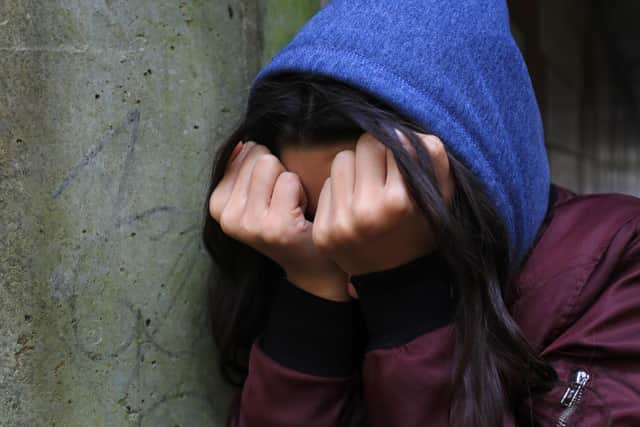Scotland’s mental health is 'at the worst level on record' as psychosis calls to NHS mental health line soar
Scotland’s mental health is “at the worst level on record”, a charity has claimed, as new figures show calls to an NHS helpline about psychosis symptoms have increased by 100 per cent in two years.
Figures from the NHS 24 Mental Health hub show overall calls have declined, but calls about alcohol issues and psychosis increased.
Advertisement
Hide AdAdvertisement
Hide AdData obtained by Scottish Labour under Freedom of Information legislation showed calls about issues such as alcohol problems, poor sleep, psychotic symptoms, suicidal acts and suicidal thoughts have risen.


Charities have also taken aim at the Scottish Government’s decision to cut £29.9 million from its mental health budget as a result of “reprofiling” and “postponement” of spend.
Jo Anderson, director of influence and change at SAMH (Scottish Action for Mental Health), said the figures reinforced the findings of the Scottish Health Survey early last month, which showed “Scotland’s mental health is, by several measures, at the worst level on record”.
“Demand for mental health support is already high and is likely to remain that way for some time, yet this comes weeks after the Scottish Budget delivered a real-terms cut to mental health spending, rather than the prioritisation of mental health support that is so desperately needed,” she said.
Calls regarding alcohol problems have risen by more than 600 in two years, with calls regarding psychotic symptoms more than doubling – by more than 5,000 – since 2021, when the reason for calling began to be recorded.
In 2021, a total of 1,282 calls to the NHS hub related to alcohol, a total that then increased by 47 per cent in 2023, to 1,885 calls. In the same year, the NHS hub received 5,112 calls about psychotic symptoms, which increased to 10,259 in 2023 – an increase of 101 per cent.
Nick Ward, chief executive at Change Mental Health, said the Scottish Government’s Budget saw the ministers “unable to back their new Mental Health and Wellbeing Strategy and Delivery Plan with the funding and resource necessary to tackle the mental health epidemic”.
“There is rising demand for mental health services in Scotland,” he said. “When people are in need of help, they are not getting the mental health support they deserve when they need it.
Advertisement
Hide AdAdvertisement
Hide Ad“We need urgent change to the way we deliver mental health care and how we fund it. What we need now is action, not warm words.
“We are calling for a different approach that radically reshapes the Scottish mental health landscape, so that we can all maximise the opportunities of the new Mental Health and Wellbeing Delivery Plan.”
Scottish Labour called for increased spending on mental health. The party’s mental health spokesperson, Paul Sweeney, said it was “incredibly worrying” to see calls to NHS mental health services regarding issues such as suicidal thoughts “sky-rocketing”.
“It is clear that mental health services are at breaking-point, with the safety of thousands of Scots now at risk,” he said. “After years of broken SNP promises, mental health nurses and services are being left high and dry. This has to end.
“Scottish Labour will continue to call for better mental health services across the board, including a dedicated mental health worker in every GP surgery and an increase in the proportion of the health budget spent on mental health.”
Dr Jane Morris, chairwoman of the Royal College of Psychiatrists in Scotland, said the figures were “a huge concern to us”, particularly the rise in calls involving psychotic symptoms, “which are potentially related to the most severe mental disorders”.
“These illnesses need to be treated effectively and without delay, but sadly these are the very conditions where we’re seeing the worst manpower shortages,” she said. “It is no wonder the lack of service provision is leading to an increase in symptoms reported.”
Dr Morris also called on the Scottish Government to boost spending for mental health.
Advertisement
Hide AdAdvertisement
Hide AdMental well-being minister Maree Todd said: “It is good that more people feel able to come forward and ask for help, and our increased investment in NHS 24 is helping ensure more calls can be responded to.
“We’re committed to improving mental health service provision in primary care settings and focus more on prevention and early intervention in the community, providing high-quality mental healthcare in general practice.
“More than £1.3 billion will support mental health services, with £290.2m direct investment – more than double that in 2020/21 – enabling record numbers of staff to provide more varied support and services to a larger number of people than ever before.
“We are determined to do all we can to reduce alcohol and drug-related harm and continue to work closely with Alcohol and Drug Partnerships (ADPs) and the third sector to address this, backed by substantial investment through National Mission funding.”
Comments
Want to join the conversation? Please or to comment on this article.